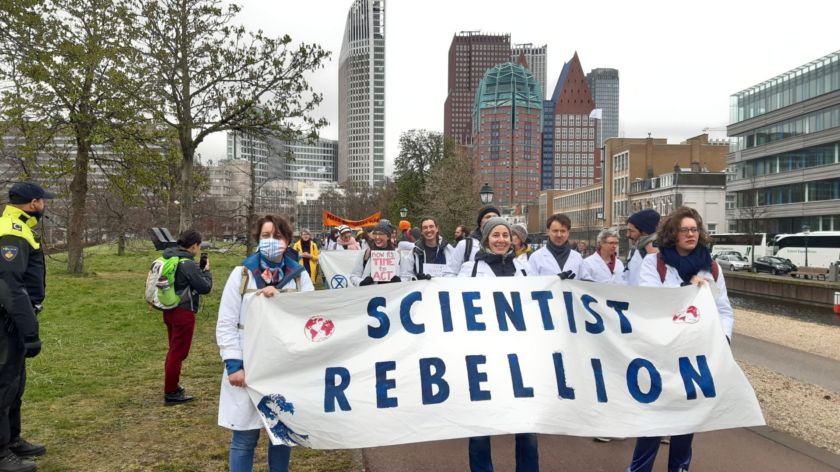Scientists will join climate barricades more often in the future
-
 Scientist March in Den Haag. Photo: Elodie Duyck
Scientist March in Den Haag. Photo: Elodie Duyck
Last week, the new action group Scientist Rebellion took worldwide action to demand an emergency plan for the climate. In the Netherlands, a disruptive protest resulted in seven arrests. ‘If research is not enough, we will take to the streets to make clear how urgent the situation is,’ says Marjan Smeulders, spokesperson for Scientist Rebellion and microbiologist at Radboud University.
Scientist Rebellion is a sister organisation of Extinction Rebellion, an international activist movement that protests against climate change and the loss of biodiversity. The new action group is an independent coalition that exists of scientists from 25 countries. Last week, during the global week of actions, they had their first protest.
During the Scientist March in The Hague, fifty scientist and also a group of non-scientists participated. Seven scientists were arrested because they put up a blockade in front of the personnel entryways of the Ministry of Economic Affairs and Climate. ‘Large societal changes do not happen without disruptive actions,’ microbiologist Marjan Smeulders explains.
Emergency plan
The microbiologist is part of Scientists4Future, a coalition of scientists who out their concerns about climate change. Through academic institutions, they try to change the system. Smeulders was asked to talk about the actions of Scientists4Future during the global week of actions. ‘I then decided to join Scientist Rebellion and was also asked to become their spokesperson.’
The goal of the global week of actions was to make clear that the government needs to come up with an emergency plan. ‘The climate crisis should be handled just like the covid crisis. They should declare a state of emergency and take emergency actions,’ says Smeulders. ‘Think of, for example, press conferences during which the government informs civilians and companies on how to take measurements that fight climate change.’
More extreme ways
For a long while now, scientist have been trying their best to bring more attention to climate change. ‘We have been gathering and spreading knowledge for years with the goal to make government institutions realise how serious climate change. They did not listen. That is why, sadly, we now have to find more extreme ways to get this problem the attention it needs.’
‘The government should actually be the one to conclude that the situation is extremely worrisome’
The microbiologist regrets that this is necessary: ‘From climate reports by the UN Climate Panel IPCC, the government should be the one to conclude that the situation is extremely worrisome. That we need to take action and protest is ridiculous.’ But it does work. Smeulders: ‘By having scientists take to the streets, you create public visibility, and you show how urgent it is to take measurements immediately.’
In the future, Scientist Rebellion will take action more often for sure. ‘Climate change is not something that you solve easily and last week was a success,’ Smeulders says. The next step is becoming more well-known and making the number of Dutch scientists that are part of the group bigger. ‘Until now, I am the only scientist from Nijmegen.’
Peaceful actions
When it comes to climate justice and emergency help actions, Scientist Rebellion has the same core values as Extinction Rebellion. For example, they only carry out peaceful actions that are based on autonomy and decentralisation, everyone is welcome, and they don’t take part in identity politics.





Robin d’Arcy Shillcock schreef op 15 april 2022 om 19:21
Oh dear… If scientists cannot bring across their ideas through research result they reslly believe that carrying banners and blocking the back entrance to the Ministry of Economic Affairs and getting arrested will have the desired effect? Sweet dreams, Mrs. Smeulders…
As scientists Scientist Rebellion ought to research the three papers IPCC produced, and carefully examine the scenario’s put forward in those papers: there are various levels and for some reason everyone sniffs out the bleakest, most catastrophic scenario as being the most viable model.
Take, as a comparison, the models the Dutch government based their measures on. These were widely off the mark, e.g. far fewer deaths than predicted.
In fact, if Netherland (why the “s”? It’s only one country), were to succeed in reaching the “dot on the horizon” the global effect would be something like 0,0004 %, a risible figure wouldn’t you say?